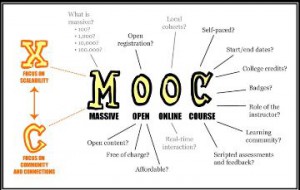The Massive Open Online Course (MOOC) revolution continues to gather pace with more and more courses becoming available every day via sites like Coursera and the Harvard/MIT run edX. Entire universities are now joining the revolution, partnering with MOOCs to provide content.
We asked Griffith University MBA Director Dr Nick Barter (NB), QUT Graduate School of Business Executive Director Bob O’Connor (BO) and University of South Australia MBA Program Director Bob Gilliver about the impact of MOOCs on the traditional MBA.

Nick Barter: The real impact on MBAs is the availability of content online. At Griffith we are putting our MBA online, this means digitising much of what might be considered standard lecture content. The impact of MOOCs/online is in terms of delivery of MBAs causing a flipping of the classroom and a return to ‘old style’ small tutorial groups with extensive discussion. While this may be delivery mode, it should be noted that MOOCs are likely to put price pressure on the traditional MBA model.
Bob O’Connor: MOOCs will certainly broaden the distribution of the content/information covered in the MBA, especially to those that cannot access traditional MBA programs (due to impediments ranging from geography, price, inflexibility of employment or home duties, social or cultural). Quality MBA programs have already moved from information distribution to a focus on analysis and understanding in the context of the broader physical, cultural and business environment. Thus MOOCs may offer MBA programs an additional option for participants to gain the basic knowledge (distribution), rather than doing all via methods offered by the MBA school (pre reading, online, classes)
Bob Gilliver: We are expecting that MOOCS will attract more people to do an MBA. Once they develop confidence in their own study skills, and confidence in the depth and breadth of material covered in an MBA, they are likely to feel more comfortable in enrolling in the full program
In the context of an MBA, how does a MOOC learning experience differ from a traditional full-contact learning experience?
NB: Face to face is the richest form of interaction that can take place, the digital world is unlikely to ever replace that richness. Nevertheless, a richness of experience can be offered by online and while there will be a greater range of delivery models in the future. I expect one model for the MBA will be a digital course that is topped and tailed/peppered with face to face experiences to help enrich the learning experience. That said in future (not neccessarily the near future) the face to face content will be premium priced. This is once the new normal of digital delivery is established.
BO: The MOOC’s offer great flexibility, though most of its focus is on information dissemination (to the masses).
BG: We will seek to ensure there is no difference. We will maintain group-work, and a high level of interactivity between participants.
Will the limited contact associated with MOOCs diminish learning outcomes?
NB: No, learning outcomes will be the same. That is the commitment every MBA provider (not least Griffith) will ensure.
BG: Not at all. Contact hours would be the same, and in fact the depth of interaction is stronger, because participants have more time to think and reflect, than they do in a typical face-to-face classroom.
BO: Yes if left at that, though not so if combined with analysis, discussion, case study and challenges









